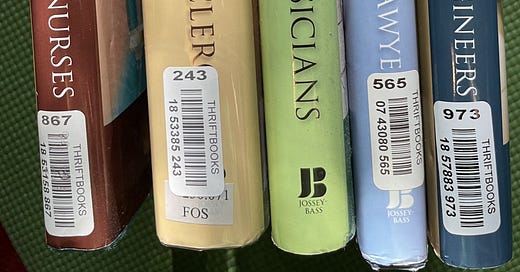Several years back, the Carnegie Foundation for the Advancement of Teaching sent a bunch of researchers out to medical schools across the country and tasked them with assessing how we teach doctors. That research became the book Educating Physicians, which, upon reading, started my obsession with medical schools. It’s not that I wanted – or want to – be a doctor; it’s that it of blows my mind that you can take a young 20 something recently doing keg stands and within a few years turn them into a brain surgeon.
The study didn’t stop there. The Carnegie Foundation studied five professional careers: physicians, nurses, clergy, engineers, and lawyers. For each, researchers asked: what are the core competencies needed? How are they taught? Is it working, or not working? Are we happy with how some of society’s most trusted workers – the people who treat our illnesses, settle our disputes, build our bridges, council us in ethics – come out of school able to practice those professions? What policy-level educational barriers stand in the way of us getting the outcomes we need to? How does education achieve the formation of professional identities?
I’ve slowly been working my way through this book series, and frankly I’ve found these to be some of the most helpful resources in my own career in adult education. The curriculum for these careers have enormous challenges. How do you teach a doctor to have empathy, a nurse to have creativity, an engineer to consider the ethical obligations of safety to the public? How do you create opportunities to practice and scaffold knowledge when there’s such a massive gap between the layperson and the expert? It’s also just fascinating; I love the anecdotes from students on how they learn and seeing connections between what these fields have tried and models of learning that predominate today.
However, I wouldn’t call these tomes light reading. They can also be hard to source (I’ve scrounged my copies on Thrift Books and Ebay over several years). In hopes others can enjoy and learn from these series, I’ll be doing a 5-part series on this Substack summarizing key points from each professional field and attempting to link them to applications from those of us working in adult ed but not a higher university setting. It’s a departure from analysis of education in fictional stories, but…I want to write them, I think others can learn from these studies, and they’re not all going to come in a row anyways (I still haven’t even finished reading the book on clergy).
Law school is fascinating. Nursing school is fascinating. Really I just want to go to school for the rest of my life and get to see how everyone learns in every field – but in lieu of that, I’ll write some book reviews instead.
Coming soon to a Substack near you: your own personal Sparknote guides to:
· Educating Physicians: A Call for Reform of Medical School and Residency (Carnegie’s own summary of this work is here)
· Educating Engineers: Designing for the Future of the Field (Carnegie’s own summary of this work is here)
· Educating Clergy: Teaching Practices and Pastoral Imagination (…I didn’t forge the link; Carnegie doesn’t have a summary online)
· Educating Nurses: A Call for Radical Transformation
· Educating Lawyers: Preparation for the Profession of Law (Carnegie’s own summary of this work is here)
It’s wild what humans are capable of learning and teaching.
My Bookshop storefront has links to a few of these if you want your own copy; however, as stated above, you’re much more likely to find them searching used sites. If you do buy through my link, I earn a small commission. But again…don’t.



